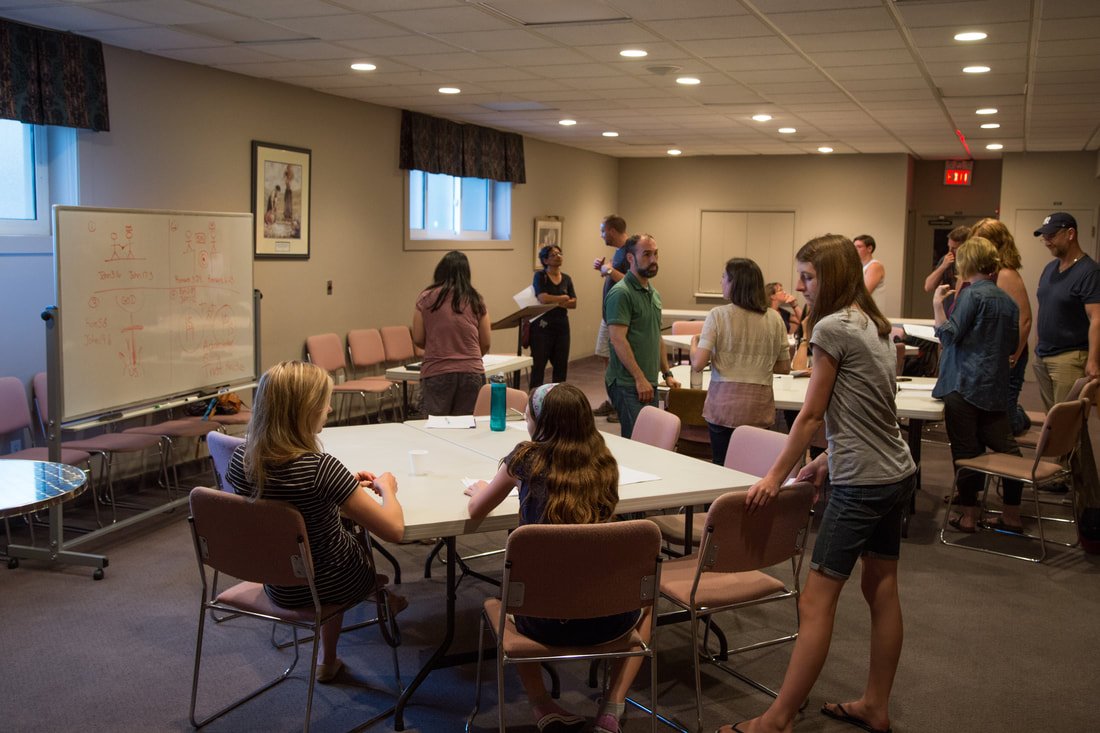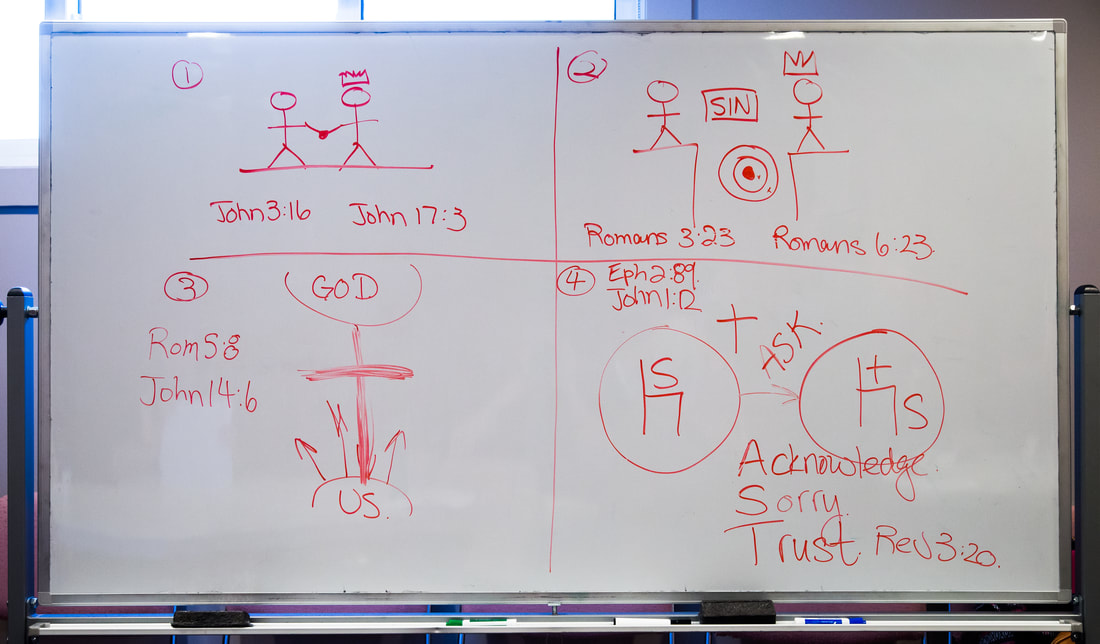 Hebrews 11:1-2 read: Now faith is being sure of what we hope for and certain of what we do not see. 2 This is what the ancients were commended for. I share this verse in a lot of different contexts and also reflect on it a lot in my own personal walk with God. This idea of entering into the exercise of faith is both a challenge and opportunity. How have I lived? What has been my legacy? Let me now expand this out to the church. We may not be ancient here at GBC but we have been around now for over 50 years and many years before that. How have we lived? What has been the legacy of this place? For both of us I hope it’s this: living by faith! After the writer of Hebrews wrote this verse he recounted some of the giants of the faith, people like Abraham and Noah but then he pauses and inserts these verses: 13All these people were still living by faith when they died. They did not receive the things promised; they only saw them and welcomed them from a distance… 14People who say such things show that they are looking for a country of their own. 15If they had been thinking of the country they had left, they would have had opportunity to return. 16Instead, they were longing for a better country—a heavenly one. Therefore God is not ashamed to be called their God, for he has prepared a city for them. Faith is often an overused but misunderstood word. It means essentially to relinquish trust in ourselves and give it over to another. Faith, as the text shows, is the medium by how God makes himself known-it moves mountains, heals the sick, changes the course of people’s lives...and it is the means of entrance into the kingdom of heaven. Faith then at it cores is faith in Jesus Christ as the son of God who makes us come alive! Here’s what I believe the text to be saying to me and anyone else reading it: God does want us to remember our heritage. Yes we learn from it, but it’s there to launch us to greater acts of faith going forward not to rest complacently. This is a call to ACTION! What is the best legacy we can leave? We see that in verse 16-God was not ashamed of them. Why wasn’t he? What can we learn from these heroes of faith we can apply to our lives? We see: 1. They were never satisfied They kept seeking a deeper relationship with God. It’s not that things are bad, they just wanted all that God had for them. Christians are made to climb mountains, not sit on them! So let’s go after everything God has for us. 2. They never lost hope The promises of God are not always realized in this life. They can be confusing and cause people to walk away and become disillusioned. It takes a step of faith. They never gave up. We should live by faith not by sight [2 Cor.5:7], so let’s not get discouraged, stick with it and see God move. 3. They never looked back We sometimes get a sense of nostalgia looking back, longing for the “good old days”. As with them we should renounce the desire to go back to the way things were settling for the past. The good old days are still ahead! It’s great to reflect and celebrate, but let’s not get bogged down and mired in it- let’s keep pushing ahead, bearing fruit and planting shade trees we’ll never sit under. How would I sum up? Faith is often translated into the acrostic: Forsaking All I Trust Him. That’s what it means to live by faith. God is definitely not ashamed of those who live this way! The past is important as a measure (trust me, I’m a historian I get this) but it shouldn’t be a pair of handcuffs. May we instead look to build our own legacy, cause a ripple in the pond, longing to see the Lord work marvelously in OUR age and may we be found faithful!
1 Comment
On Friday evening we had the opportunity to be guided through a practical “How to share your faith” workshop with those around us with specifically focused on talking to campers at Oasis. We were guided by Rebekah, Corey and Mandy (P2C staff who attend GBC) through what the bible has to say about evangelism, our role as we respond to God, and how to share the gospel.
The Biblical Basis for Initiative Evangelism
What does the Bible say about initiative evangelism?
Our Response to the Great Commission
1) Have faith
John 4:35: “Don’t you have a saying, ‘It’s still four months until harvest’? I tell you, open your eyes and look at the fields! They are ripe for harvest.” Why would I sow if I didn’t think anything would happen? We should expect God to do something through us when we share the gospel. Our first role in evangelism is simply to have faith that God is at work and that God loves your lost friends and family, and the lost kids at Oasis. He has opportunities for us, and He can and does choose to work through those who are available to Him. One way to express this faith is by praying and asking God to give you opportunities to share with others. 2) Be filled with the Spirit Acts 1:4, 8: 4 “On one occasion, while he was eating with them, he gave them this command: “Do not leave Jerusalem, but wait for the gift my Father promised, which you have heard me speak about. But you will receive power when the Holy Spirit comes on you; and you will be my witnesses in Jerusalem, and in all Judea and Samaria, and to the ends of the earth.” The disciples were given the command to be Christ’s witnesses and take the gospel to the ends of the earth, however, they were instructed not to leave Jerusalem until they had received the Holy Spirit. As Christians we have the Holy Spirit and these verses show the necessity of the Holy Spirit in effective evangelism. We need to depend on Him as we share the good news, rather than sharing in our own strength. We can do this by asking the Holy Spirit to fill us and give us his courage, strength, words, and direction, as soon as we recognize an opportunity or God’s leading to be a witness. 3) Take action This is the result of the two responsibilities we just discussed. As we have faith and ask for opportunities, and as we are filled with the Holy Spirit, it’s our job to pray, take the initiative, and step out in obedience when God gives us opportunities to share the good news. The great thing is you don't have to be a super-Christian or have an amazing gift of evangelism; because you have the living God inside of you!
God’s Role: Growth of The seed
1 Corinthians 3:5-9: 5 What, after all, is Apollos? And what is Paul? Only servants, through whom you came to believe—as the Lord has assigned to each his task. I planted the seed, Apollos watered it, but God has been making it grow. So neither the one who plants nor the one who waters is anything, but only God, who makes things grow. The one who plants and the one who waters have one purpose, and they will each be rewarded according to their own labor. For we are co-workers in God’s service; you are God’s field, God’s building. God is the one who causes growth in people’s lives, not us. It is his role to produce fruit and change people’s hearts. Jesus promises that He will play His role – there will be a harvest for us to bring in, and His Kingdom will always grow. And if we step into our roles, we get to be a part of it all! When we are faithful to the opportunities God gives us to share Christ, and we leave the results up to him, we are truly partnering with God in his kingdom work. Rebekah’s Oasis Story Before and during Oasis, I had been praying for opportunities to share the gospel with the kids. I was impacted seeing others get up early to ride the bus with the kids, and decided to do it one morning. The day I rode the bus to camp one of the campers, lets call him Bartholomew (not his real name), was singing one of the camp songs “My Hope is in the Lord,” and joking around. I saw an opportunity to go deeper. We got talking about what the word “Lord” meant, and I asked if anyone had ever explained to him what it meant to have Jesus as his Lord and Saviour. He said no, but he had wanted to know for years. We were almost at camp, so I asked if I could share that with him at lunch. He said yes! At lunch his leader and I prayed for God to speak through us. Then we sat aside with Bartholomew and got to share the gospel with him. We asked him many questions along the way to see how much he understood. He was able to repeat back clearly what Jesus had done for him. We asked him if he believed this, and if he wanted to receive Jesus as his Lord and Saviour. He said yes, and we got to lead him in a prayer to do so! Afterwards, Bartholomew had a huge smile on his face and said, “I’ve wanted to do that for years, but I never knew how to!” He called us “brother” and “sister in Christ” for the rest of Oasis. There are many opportunities at Oasis to share the gospel with kids, so I encourage you to start praying now for opportunities and for God’s strength to take them! How to Share the Gospel
Sharing the gospel” is to tell the redemption story the of the Bible. The Bible is, to Christians, a history book of God’s revelation to humanity. Revealing Himself, His purpose and His design, for us His creation. In short His Kingdom and how we humans can be in it on earth and then in eternity. There are two common ways to share that revelation:
For Oasis the most relevant model is the concept model because it can help put the pieces together for the kids. Effective evangelism is listening yourself and being present. Getting to know your listener is very important to understand their starting point. If they have a belief in God introduce, then to Jesus. If they know Jesus share that they have an opportunity to respond to Him and ask if they ever have. Sometimes there have been years of investment from others and the Holy Spirit and someone just needs to lay out the gospel in a clear way and leaves them with an understanding of what they need to make a response on. We’ve all experienced vulnerability breeding vulnerability but we can’t stop there. Vulnerability should be paired with curiosity. If we are just vulnerable it can get awkward but if we are vulnerable and then follow with curiosity the person we’re talking to has a starting point. For example, if we share about how we are struggling with anger and then ask a question like “How do you deal with that? Can you relate to what I’m going through?” the foundation of vulnerability is set and the other person can begin with answering the question before opening up themselves.
Brainstorm with your co-leader on how could you bring this up with your crew. At the beginning of the week is a good idea because you have their full attention when they aren’t exhausted yet. Use the 4 quadrant diagram as your reference for the rest of the week. Ask questions like:
Practice drawing and explaining this quadrant tool.
Sometimes the hardest part of sharing the gospel can be just getting started. We all have conversations with people every day, so how do we transition from talking about everyday topics to sharing the gospel? It’s helpful to have some transitions in mind to help segue. Often sharing the gospel starts with having a spiritual conversation.
Some ways to segue into Spiritual Conversations
Some ways to segue from a Spiritual Conversation to the Gospel
10 Practical Tips
Additional Resources |
Pastor Chris"At GBC we're serious about the Bible, serious about the truths that are found in it and living in Him but also like to laugh, cry and experience life together." Archives
January 2024
Categories |



